2021 Release Notes
New functionality and system improvements released in 2021.
You can get notified of BigPanda releases and updates right in your inbox. Register here for our monthly product updates email!
December 2021
What's New: Correlation Patterns API, UI Facelift
Correlation Patterns API
The new Correlation Patterns API enables administrators to use the API interface to manage patterns BigPanda uses to correlate alerts together into high level incidents. Create, Retrieve, Update, or Delete correlation patterns to tailor alert correlation to the specifics of your infrastructure and system.
EV2 Required
The Correlation Patterns API uses the underlying systems of the Enrichment V2 Engine. Your organization must have migrated to Enrichment V2 to use the Correlation Patterns API.
Read more about using the Correlation Patterns API here!
UI Facelift
BigPanda has upgraded to a sleeker, smoother UI to make navigating and viewing incidents in-app even easier. While the look and feel of the platform is different, the features you know and love are the same.
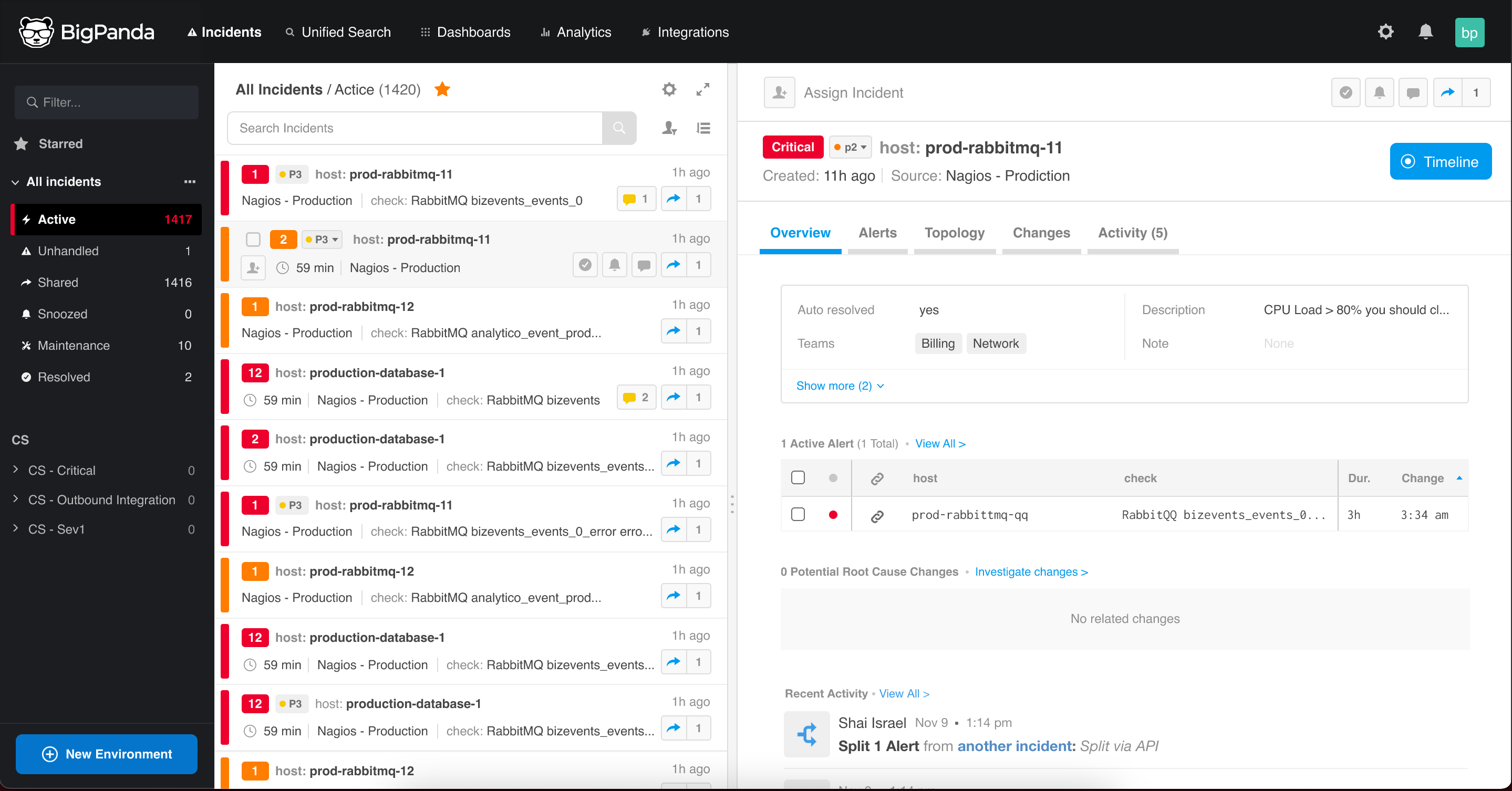
BigPanda's New Look and Feel
Have a look at the new BigPanda UI here!
ServiceNow Enhancements Nov 21
The BigPanda ServiceNow App now supports even more functionality to deepen and improve the management of ServiceNow incidents. This latest version includes new features for:
- BigPandaUtils Class - The class has been updated to include incident tag functions for easier access to the entire list or individual items
- Incident Tags Mapping - Users can now sync Incident Tags to SNOW Incident Fields for bi-directional sync
- CMDB Override Existing Option - Users can now provide a list of columns that can have the override_existing property set to true in the enrichment maps
- CMDB Aggregate Map - Users now have an option for a table/view that will aggregate a map based on the provided query key. (Note: BP has an array limit of 15 items)
- Maintenance for Outage Table - Users now have the option to create a BigPanda Maintenance table for planned maintenance and outages
- Support for Relationship Tables
- Sync Change Tasks for RCC - Users can now toggle between the Change Request or the Change Task Table to create BigPanda Changes
- Wildcard Support in Primary Alert Selection - Primary alert selection now supports the wildcard when matching, for example host=XYZ will match any host name starting with XYZ
- Bug fixes
The latest version of the BigPanda ServiceNow Integration can be downloaded from the ServiceNow Developer Portal.
If you are still using the older ServiceNow app from the ServiceNow app store, you may need to migrate to the new update set. Read more about migrating to the developer portal version here.
Read more about BigPanda’s ServiceNow bidirectional integration in the [BigPanda ServiceNow docs]https://docs.bigpanda.io/docs/servicenow!
API Reference Hub Enhancement
The docs site API Reference Hub is updating to add functionality and make understanding BigPanda APIs simpler.
APIs are a core tool for integrating external tools and managing incidents in BigPanda. They enable you to take self-service to the next level, and empower custom solutions and deep 2-way integrations.
To make our APIs easier to use, understand, and access, we are making a major update to our API Reference Hub. This update streamlines and improves the API documentation experience. This update will affect all existing BigPanda API documentation pages on November 23rd, 2021.
New API Reference Hub
The new docs pages will include:
- Revamped Look and Feel: The new UI makes it easier to find code samples, spot errors, identify required fields, and navigate
- Single Page Endpoints: Instead of endless scroll, our APIs are now hosted on their own individual pages. This makes for easier linking and significantly easier navigation
- Generate Code Dynamically: Create full code samples right in the docs page using interactive fields for each endpoint parameter. Code samples are generated automatically in several different languages with the defined parameters filled in
To learn more about the new functionality of the BigPanda API pages, watch a video with details on the new UI here!
This update will affect all existing BigPanda API documentation pages on November 23rd, 2021. While we don't anticipate any outages, the pages may see some changes during the day.
API Functionality
No API or product functionality will change with this update. This update only affects documentation.
November 2021
What's New: Updated ServiceNow App, Incidents API V2, Improved API Reference Hub, Enrichment Preview Performance Improvements
Updated ServiceNow App
The BigPanda ServiceNow App now supports even more functionality to deepen and improve the management of ServiceNow incidents. This latest version includes new features for:
- Incident Tags Mapping
- CDMB Aggregate Map Option
- CMDB Override option for columns
- Maintenance Plans for planned maintenance and outages
The latest version of the BigPanda ServiceNow Integration can be downloaded from the ServiceNow Developer Portal. If you are still using the older ServiceNow app from the ServiceNow app store, you may need to migrate to the new update set. Read more about migrating to the developer portal versions here.
Read more about BigPanda’s ServiceNow bidirectional integration here!
Incidents API V2
BigPanda's Incidents API allows you to manage BigPanda incidents externally and can be configured with external ticketing and monitoring tools.
The Incidents API (V2) is a deeply improved version of our previous Incidents API, adding key functionality for customers who use the back end of BigPanda or automated integrations.
The new Incidents API V2 enables you to:
- Search for Incidents with BPQL (BigPanda Query Language)
- Retrieve an Incident by ID
- Merge incidents
- Comment on Incident
- Assign Incident
- Unassign Incident
- Snooze Incident
- Unsnooze Incident
- Add Incident Tags
- Split an Incident
Read more about using the Incidents API V2 here!
Improved API Reference Hub
To make our APIs easier to use, understand, and access, our API Reference Hub has . This update streamlines and improves the API documentation experience. The new docs pages will include:
- Revamped Look and Feel: The new UI makes it easier to find code samples, spot errors, identify required fields, and navigate
- Single Page Endpoints: Instead of endless scroll, our APIs are now hosted on their own individual pages. This makes for easier linking and significantly easier navigation
- Generate Code Dynamically: Create full code samples right in the docs page using interactive fields for each endpoint parameter. Code samples are generated automatically in several different languages with the defined parameters filled in
To learn more about the new functionality of the BigPanda API pages, watch a video with details on the new UI here or start exploring the API Reference Hub here!
Enrichment Preview Performance Improvements
Enrichment Preview now works better than ever thanks to a series of back end performance improvements.
Learn more about BigPanda's improved alert enrichment here
Automatic Incident Triage General Availability
We are happy to announce the upcoming General Availability of Automatic Incident Triage (AIT). AIT simplifies and shortens triage by automatically adding actionable business context to incidents. You can define conditions to automatically calculate incident tag values, and trigger workflows both within BigPanda and external collaboration tools based on tag values to streamline the incident management lifecycle.
On November 14th, we will be enabling AIT for all BigPanda environments. Your administrators will then be able to configure automatic triage processes to fit your needs.
To learn more about Automatic Incident Triage, visit our Automatic Incident Tags Documentation or see the BigPanda University AIT Course
October 2021
What's New: AppDynamics V2.0, Incident Tags Increased Data Retention, AutoShare on Environment Change
AppDynamics V2.0
The BigPanda AppDynamics integration has been upgraded! The integration can now receive all event types in AppDynamics, not just Health Rule Violations. In addition, tags that do not match the normalizer will no longer be dropped but can be included as additional tags, and events now support the inclusion of a note field.
If you previously had integrated with AppDynamics, you will need to update to the newest version to use the latest functionality.
Read more about integrating with AppDynamics here!
Incident Tags Increased Data Retention
Incident tags are key-value pairs that can be added to incidents for additional incident enrichment. Tags can be used to sort your incidents to ensure that you have visibility on the most relevant tasks. Incident tags are currently in Beta and need to be enabled for your organization to use.
With this update, when an incident is resolved, its incident tags will remain tied to the incident for 18 months. If the incident is reopened, it will have all of the existing incident tags, with new ones added as the reopened incident develops.
Read more about using Incident Tags here!
AutoShare on Environment Change
AutoShare enables you to configure rules to automatically share BigPanda incidents to your collaboration and ticketing tools. As incidents are assigned to an environment, AutoShare rules escalate the incident through email, SMS, Jira tickets, or more. With this feature, when BigPanda incidents move to a different environment, any AutoShare rules tied to that environment will automatically trigger, sharing or updating the incident through the relevant channels.
Starting on October 19th, Improved AutoShare is being gradually pushed out to all customers over the next 4 weeks.
Read more about using AutoShare here!
Improved AutoShare
AutoShare enables you to configure rules to automatically share BigPanda incidents to your collaboration and ticketing tools. As incidents are assigned to an environment, AutoShare rules escalate the incident through email, SMS, Jira tickets, or more.
Now, when BigPanda incidents move to a different environment, any AutoShare rules tied to that environment will automatically trigger, sharing the incident through the relevant channels.
If the incident has already been shared to a channel, manually or through a previous AutoShare, the changes will instead be sent as an AutoShare update. Even if the changes would trigger multiple shares, incidents are only shared to a channel once per update.
Starting on October 19th, Improved AutoShare will be gradually pushed out to all customers over the next 5 weeks.
To learn more about using AutoShare, see the Sharing documentation here!
September 2021
What's New: Incident Tags Retention
Incident Tags Retention
Incident Tags are ideal for adding customer-specific incident context based on the alert patterns and metadata of the incident itself. Incident Tags can be used to add details and context to incidents, and help your team prioritize incidents. With this latest update to the Incident Tags function, Incident Tags will now remain tied to resolved incidents for 18 months.
Read more about using Incident Tags here!
July 2021
What's New: Improved AutoShare Editor, Environments Query Language Support, and New Environments API
Improved AutoShare Editor
AutoShare defines rules to automatically share BigPanda incidents to ticketing systems, collaboration tools, or specific team members, helping your team manage incidents better, faster.
The AutoShare editor has been updated to streamline your AutoShare management. You can now configure all AutoShare settings and messages in one step, ensuring each shared incident has the necessary details for your team to take action.
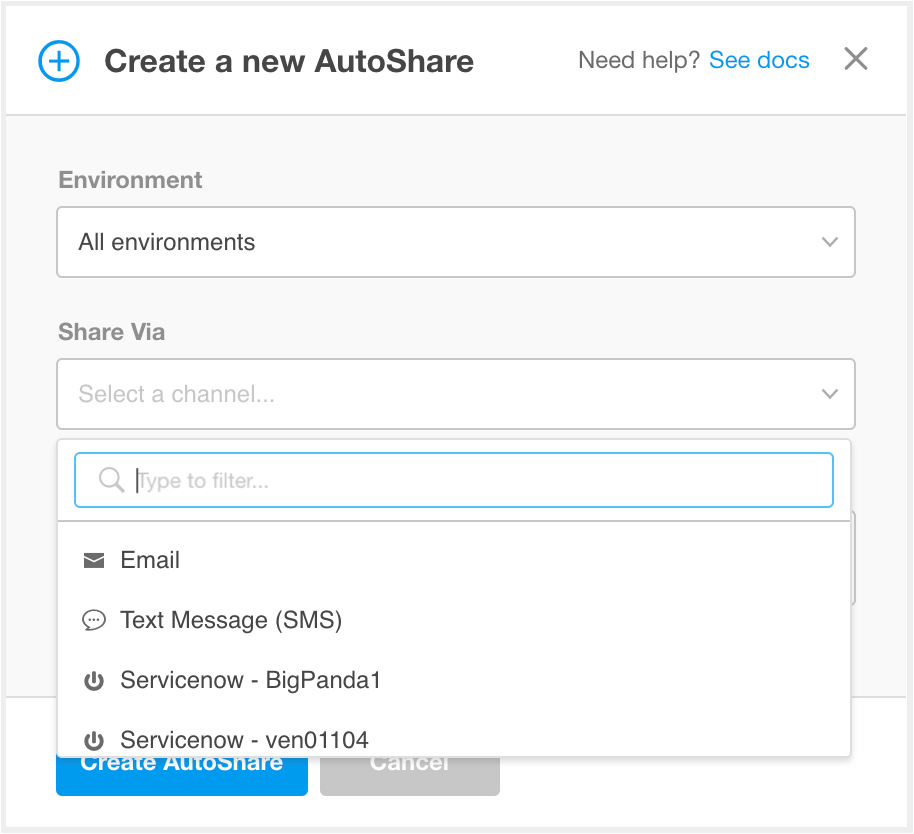
AutoShare Editor
Additionally, the AutoShare settings page has an updated UI to better match the look and feel of the BigPanda experience.
The new AutoShare editor will be rolling out throughout July.
Read more about using AutoSharing here!
Environments BPQL Support
BigPanda Environments group incidents together for improved automation and visibility.
In addition to the Basic environment builder, BigPanda environments now support BigPanda Query Language (BPQL) to create criteria and conditions for environments. The Advanced editor is ideal for complex environments that may be tedious to create in the Basic editor, for environments that are built from Unified Search results, or for organizations that use BigPanda APIs to manage their systems.
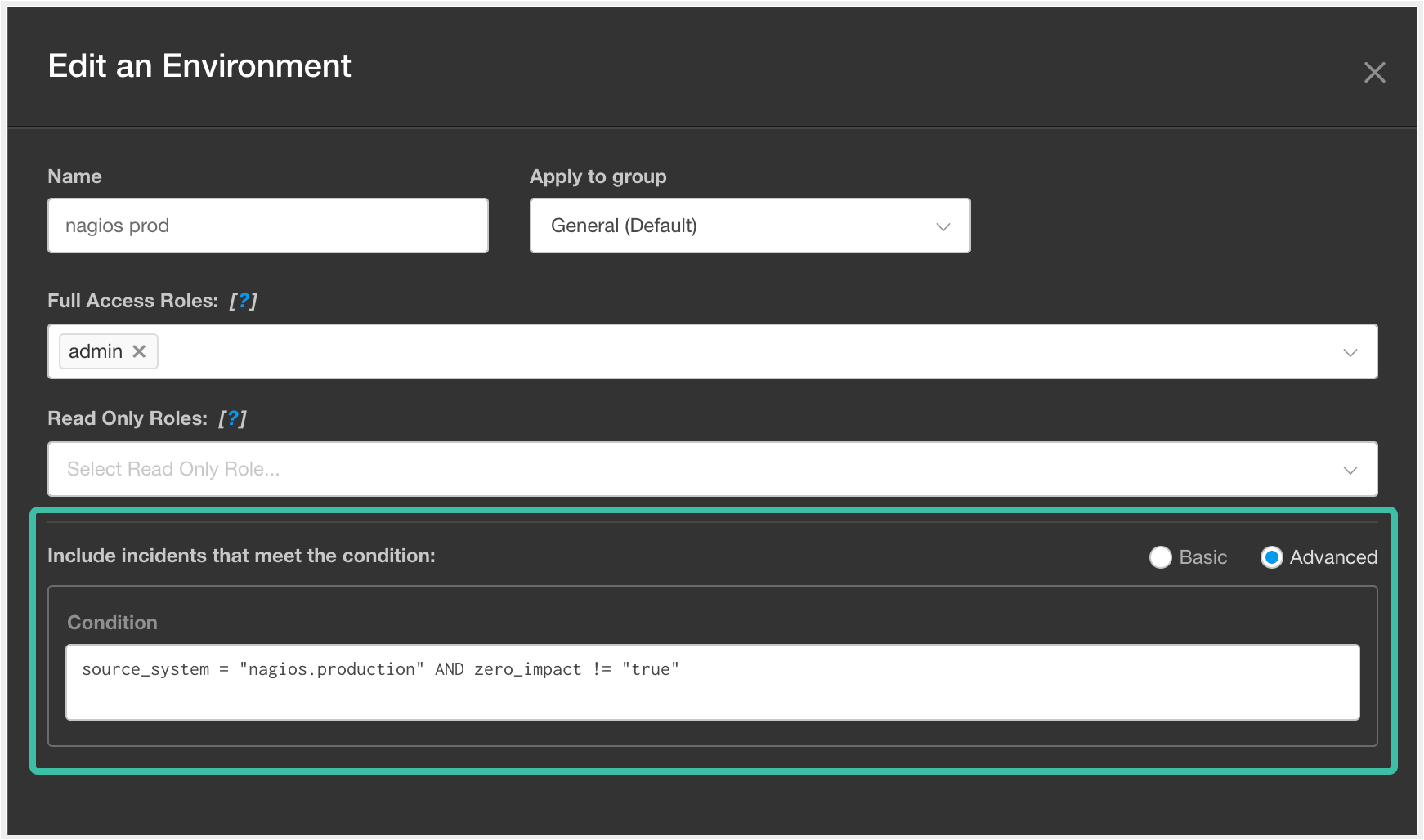
Advanced Environment Editor
The Advanced editor must be enabled by Customer Support. To request beta access to the Environments Advanced editor feature, contact BigPanda Support.
Read more about using the Advanced editor here!
Environments API (BETA)
The new Environments API enables administrators to use BigPanda Query Language to manage their custom environments. Create, Retrieve, Update, or Delete Environments to improve AutoShare, Dashboards, and team workflows.
The Environments API is currently only available through the Beta program and is not released for general availability. To request access to the Beta program, contact [email protected].
Read more about using the Environments API here!
June 2021
What's New: Improved Correlation Patterns Editor
Improved Correlation Patterns Editor
Correlation Patterns determine how alerts are clustered into BigPanda incidents. and can be customized to improve incident quality and alert compression.
The Correlation Patterns editor has been updated with an improved and more responsive Preview to help administrators find the perfect patterns. The preview includes more details on correlated alerts, better control over the alert time window and faster loading times.
Additionally, the Correlation Patterns settings page has an updated UI to better match the look and feel of the BigPanda experience.
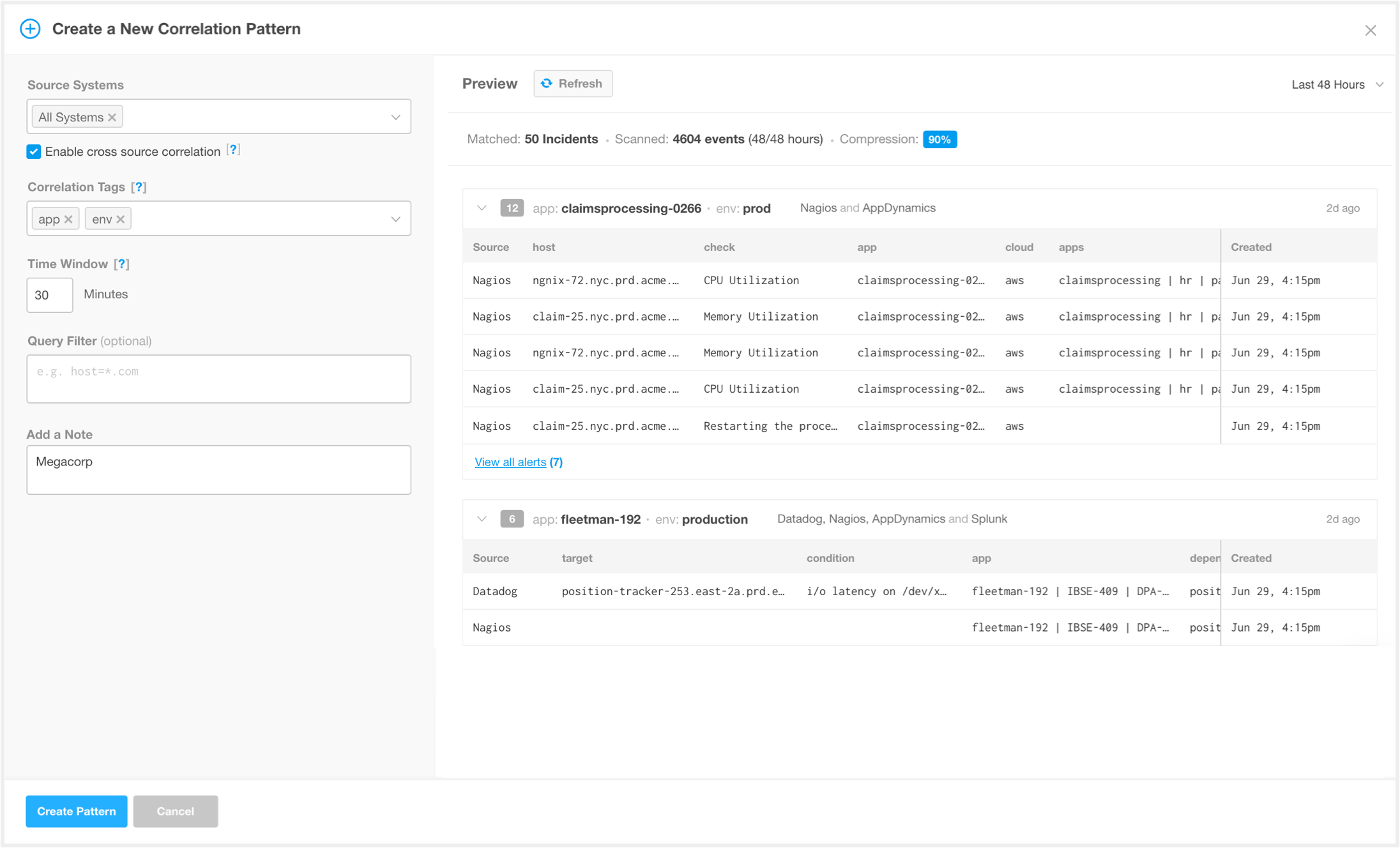
Correlation Pattern Editor
The new Correlation Patterns updates will be rolling out throughout July.
Read more about Managing Correlation Patterns here!
May 2021
What's New: Assignee Filter, BigPanda Formula Language (BPFL)
Assignee Filter
Incident Assignments allow you to identify an owner who is responsible for seeing the incident through to resolution.
The Assignee Filter update enables you to now filter the incident feed by assignee. You are able to filter by your own name to get a clear picture of incidents you are responsible for, or by another team-member's name for visibility on their workload.
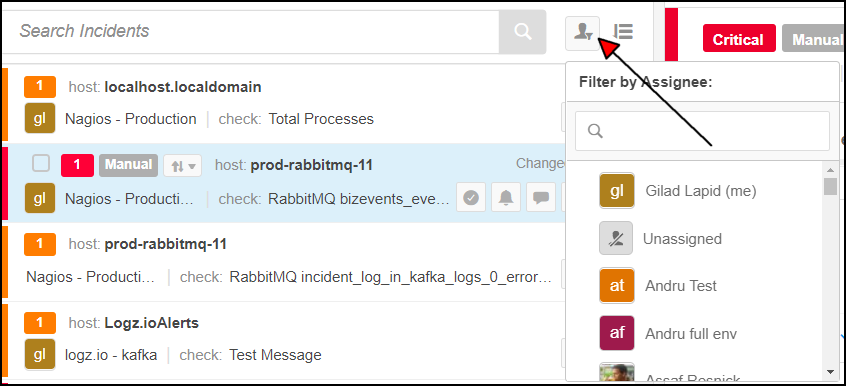
Filter by Assignee
Read more about filtering by assignee here!
BigPanda Formula Language (BPFL)
Incident tags add additional information to your incidents based on the needs of your organization, and can be added to incidents manually or using automated enrichment.
The new BigPanda Formula Language(BPFL) enables the use of complex calculations when configuring this automatic enrichment. BPFL is robust enough to pull information from alert tags or incident metadata, and supports the COUNT, UNIQUE, and IF functions in each formula.
This feature is currently only available through the Beta program and is not released for general availability. To request access to the Beta program, contact [email protected].
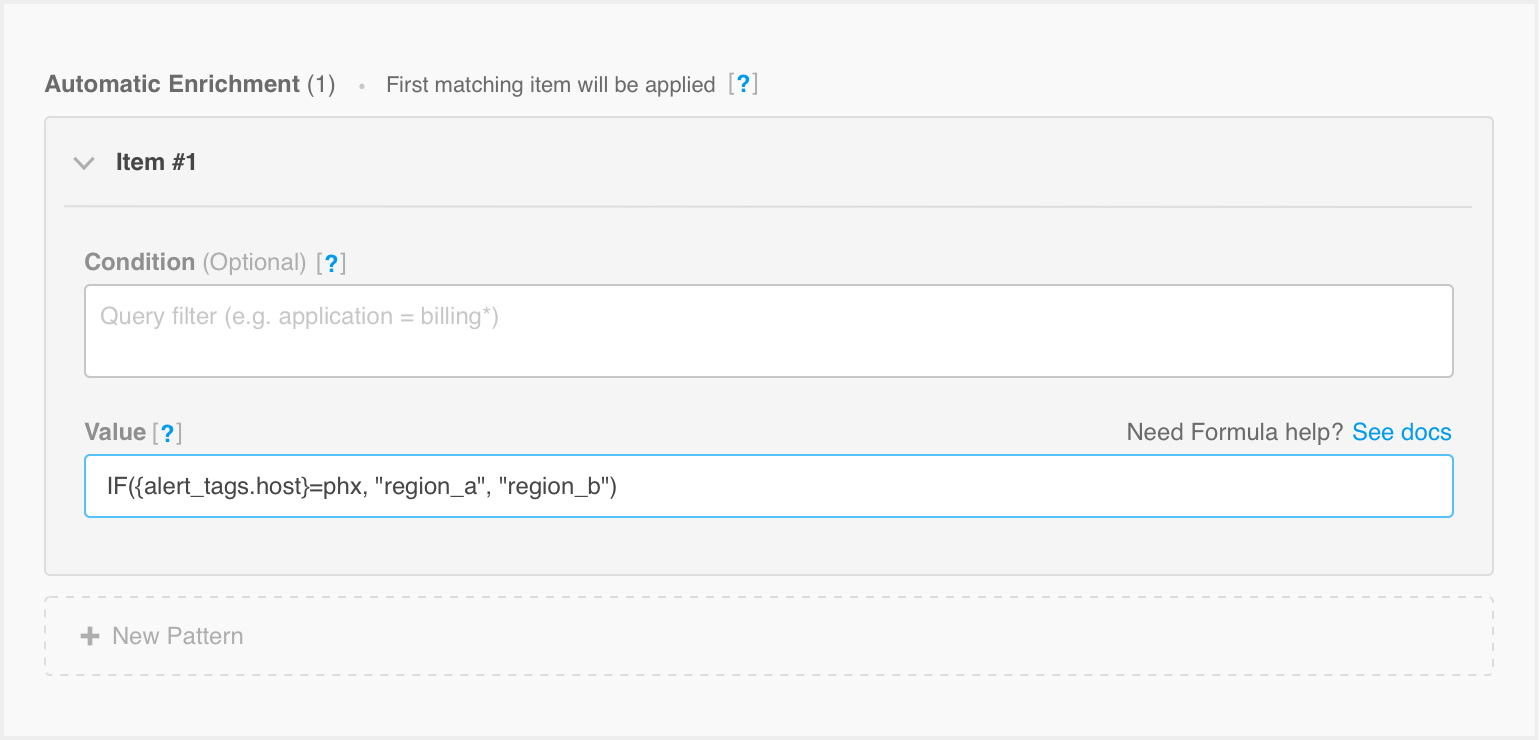
Automatic Enrichment Editor
Read more about using BPFL here!
March 2021
What's New: Service Now Changes - maintenance module, Dynatrace integration update (tags support), New Relic integration update (fix support for Targets array).
Service Now Integration Changes - Maintenance Module
The BigPanda ServiceNow Maintenance Plan integration works by setting up conditions for when ServiceNow Change Requests will automatically generate a BigPanda maintenance plan. More details can be found here.
January 2021
What's New: Integration Diagnostics Filtering and Search
Integration Diagnostics
Back in October, we released our new Integration Diagnostics tool to provide deep visibility into inbound integrations. This feature helps users tune and fix integration issues on their own. In our latest release, we have further enhanced this capability by adding advanced filtering and search options both in the UI and API, as well as a payload copy-to-clipboard option in the UI.
Detailed documentation for these new features and the diagnostics too in general, can be found here.
Updated 9 months ago
